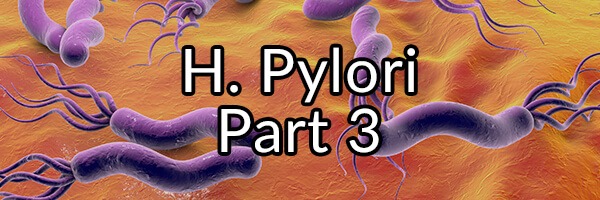In this blog series, I have written a lot about the proposed positives of H. pylori colonization. However, it is widely known that this bacteria causes a lot of health issues and concerns if left unchecked by our immune system. So when H. pylori are no longer our ally what issues can it cause for us and how is it resistant to multiple forms of treatment?
When H. pylori Goes Rogue
H. pylori is a nasty bacteria when it becomes opportunistic. It has multiple factors to its advantage to promote its survival: 1 2 3 4 5 6 7
- The bacteria can bury itself deep into the stomach mucosa, protecting itself from stomach acid, pepsin, and our immune system.
- The bacteria are able to colonize multiple parts of the digestive system: the oral cavity, esophagus, the LES, the stomach, and the duodenum.
- H. pylori are transient bacterium and move freely throughout the different areas they colonize if given the chance.
- Causes Th1 dominance, Th2 dominance, or both, and creates problems with immunity, histamine intolerance, and excessive inflammation.
- Manipulate and infect the brain-gut axis (vagus nerve, brain) to increase survival by completely modulating digestion. H. pylori are able to reduce stomach acid and pepsin production to proliferate further the stomach and duodenum. It can regulate esophageal and gastric motility, change hypersensitivity to chemical and mechanical digestive stimulants, manipulate gastric blood flow, and influence what we eat (increased cravings or decrease food intake.) It can modulate digestive neurotransmitters including acetylcholine, noradrenaline, adrenaline, and dopamine. Finally, it is also able to modulate leptin, ghrelin, calcitonin gene-related peptide (CGRP), nitric oxide, neuropeptide Y, substance P (SP), somatostatin (STS) and cholecystokinin (CCK.)
- H. pylori are able to avoid easily immune system detection by modulating inflammatory pathways, avoiding immune pattern recognition receptors by using endotoxins and flagellin, produce biofilms, reduce phagocyte potential, reduce endogenous nitric oxide production (increases blood pressure and promotes vasoconstriction,) and by reducing T cell response.
H. pylori also cause a lot of different medical conditions and health issues in the human body, that include: 8 9 10 11 12 13 14 15 16
- The bacteria can shed potent endotoxins that can leak into the bloodstream and increase inflammatory markers. Because of this, it is a known increased risk for heart and liver disease.
- H pylori have been implicated as the cause of the following autoimmune conditions: immune thrombocytopenic purpura, co-infection with K. pneumonia as the cause of rheumatoid arthritis, co-infection with Staph as the cause of Lupus, Sjogren’s syndrome. Behcet’s disease, Wegner’s granulomatosis, burning mouth syndrome, HELLP syndrome, multiple sclerosis (probiotic strains of H. pylori like cigaA+ may protect from developing MS), and scleroderma.
- H. pylori are the main cause of gastrointestinal ulcers.
- H. pylori overgrowth increases the risk of developing duodenal, esophageal, stomach cancer, and MALT lymphoma.
- The bacteria can reduce esophageal motility, gastric emptying, and small intestine emptying (third wave of the MMC.)
- The bacteria can elevate cortisol and adrenaline production over time causing adrenal fatigue.
- H. pylori overgrowth may be a clear cause of histamine intolerance and eosinophilic esophagitis because of its ability to modulate histamine and mast cell function.
- The bacteria may infect or cause inflammation to the brain-gut axis, which would lead to, vagus nerve issues, anxiety, depression, brain fog, dementia, reduced memory capacity (lower BDNF), fluctuations in appetite, lower HRV, and digestive issues.
- H. pylori produce urease which converts urea into ammonia, which if it leaks out of the gut, can cause some major issues. Ammonia buffers stomach acid promoting its survival. Ammonia is cytotoxic to the gastric cells, causing ulceration and inflammation. The body can handle elevated ammonia levels systemically by liver detoxification, but in people with liver damage or severe overgrowth and leaky gut, hyperammonemia may occur. Symptoms of high ammonia are ataxia, seizures, visual disturbances, mental issues, headaches, brain fog, and brain inflammation. L-carnitine supplementation may reduce ammonia formation and increase clearance. 17 18
- H. pylori produce hydrogen sulfide, which causes a lot of health issues, including, bloating, distension, pain, gastritis, inflammation, headache, brain fog, and halitosis. Your breath and stool may smell like rotten eggs if too much hydrogen sulfide is being produced. Bismuth and following a low thiol diet may help reduce hydrogen sulfide load in H. pylori overgrowth.
So what does this all mean? Here is a great conclusion from a recent study on H. pylori’s ability to avoid or immune system and cause infections: 19
“H. pylori has been co-existing with human host for at least 30000 years. During this long time of co-existence the bacteria has undergone evolutionary adaptation and established a comfortable niche in the human host. Unlike most other pathogenic bacteria which are cleared by the host adaptive immune response, H. pylori successfully establishes a persistent infection in its host in spite of the presence of vigorous innate and adaptive immune response. H. pylori evolved an array of mechanisms to evade both innate and adaptive immune responses. Host mediated immune response not only fails to clear the bacteria but also helps the bacteria for colonization by proving increased availability of adhesion places such as MHC II and CD74, both of these components are induced by IFN-γ and IL-8 during H. pylori infection. H. pylori virulence factors VacA, HP-NAP, Cag T4SS have been shown to cause damage in the gastric epithelium which results in peptic ulcer or even gastric cancer, if left untreated. Bacterial virulence factors together with host factors determine the severity of disease. Though multiple studies have examined how the bacteria interact with its host there is still a lack of clear knowledge about how it avoids host mediated immune responses. Furthermore little is currently known about the role of T cell subsets in controlling H. pylori infection and associated immunopathogenesis, particularly in humans.”
I could not write the explanation of why we need a greater understanding of H. pylori better myself. Pylori have colonized humans for centuries and because of our association it knows us inside out, we are the preferred host.
So is H. pylori an evil mastermind that can control our body or an ally that can help us better our health? It depends on if our immune system can keep it in check and not let it overgrow and infect different parts of the body, the state of our digestive health, when we became infected, and what strain.
If H. pylori do become a James Bond super-villain with his monocle, mustache, and a fluffy white cat, what can be done to knock it back into submission, so it becomes a tamer Dr. Evil? We will discuss new protocols and updates on the final blog entry in this series. Stay tuned!
See more from this series:
- H. pylori, Evil Mastermind or Ally? / Part 1
- H. pylori, Evil Mastermind or Ally? / Part 2
- H. pylori, Evil Mastermind or Ally? / Part 3
- http://www.ncbi.nlm.nih.gov/pmc/articles/PMC4177461/ ↩
- http://www.medscape.com/viewarticle/765623 ↩
- http://www.hindawi.com/journals/mi/2014/426309/ ↩
- http://www.jimmunol.org/content/186/6/3632.full ↩
- http://www.ncbi.nlm.nih.gov/pmc/articles/PMC4017036/ ↩
- http://www.jimmunol.org/content/165/2/1022.full.pdf ↩
- http://iai.asm.org/content/75/4/1738.full ↩
- http://www.ncbi.nlm.nih.gov/pmc/articles/PMC4017036/ ↩
- http://www.mygutsy.com/is-h-pylori-the-cause-of-allergies-brain-fog-hypothyroid-autoimmune-disorders-adrenal-fatigue/ ↩
- https://www.google.com/url?sa=t&rct=j&q=&esrc=s&source=web&cd=1&cad=rja&uact=8&ved=0ahUKEwickpSxks3LAhUEYiYKHZDjBHkQFggjMAA&url=http%3A%2F%2Fwww.ncbi.nlm.nih.gov%2Fpubmed%2F20593269&usg=AFQjCNEJJWir5UF1Evo_sd4bXWdUU4Z6nQ&sig2=B5lPB-QiFCudpS807bvztQ ↩
- https://www.google.com/url?sa=t&rct=j&q=&esrc=s&source=web&cd=2&cad=rja&uact=8&sqi=2&ved=0ahUKEwjD1sTbks3LAhXBSiYKHZ32CrQQFggwMAE&url=http%3A%2F%2Fwww.hindawi.com%2Fjournals%2Ftswj%2F2014%2F516354%2F&usg=AFQjCNHc1n2OY-V_TaJjwp6_geS9XjhkTg&sig2=wgoz31JdDE7kUx5W0PvXLQ&bvm=bv.117218890,d.eWE ↩
- http://www.ncbi.nlm.nih.gov/pmc/articles/PMC4063090/ ↩
- http://www.annalsgastro.gr/files/journals/1/earlyview/2013/ev-07-2013-06-1727.pdf ↩
- http://www.ncbi.nlm.nih.gov/pubmed/16721224 ↩
- http://www.ncbi.nlm.nih.gov/pmc/articles/PMC4480172/ ↩
- http://www.ncbi.nlm.nih.gov/pubmed/25602009 ↩
- http://www.ncbi.nlm.nih.gov/pubmed/12602515 ↩
- http://www.ncbi.nlm.nih.gov/pmc/articles/PMC1297603/ ↩
- http://www.ncbi.nlm.nih.gov/pmc/articles/PMC4177461/ ↩







Check out Life Extensions Gastro-Ease which includes PyloPass. PyloPass helps to lower h pylori by binding it and escorting it out without affecting other microbes:
https://www.youtube.com/watch?v=rs6UUplb0oA&t=74s
This is all incrediby fascinating! Can you give us a relative time frame for when the next part of this series will be released??
https://fixyourgut.com/gerd-treatment-protocol-2-reduction-of-opportunstic-h-pylori/